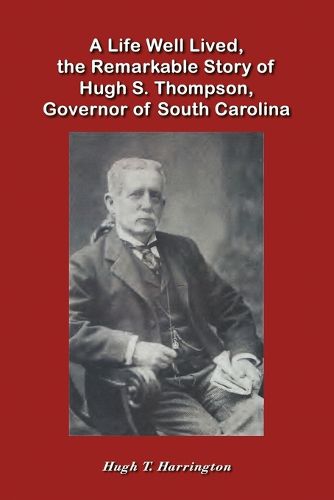Readings Newsletter
Become a Readings Member to make your shopping experience even easier.
Sign in or sign up for free!
You’re not far away from qualifying for FREE standard shipping within Australia
You’ve qualified for FREE standard shipping within Australia
The cart is loading…






This title is printed to order. This book may have been self-published. If so, we cannot guarantee the quality of the content. In the main most books will have gone through the editing process however some may not. We therefore suggest that you be aware of this before ordering this book. If in doubt check either the author or publisher’s details as we are unable to accept any returns unless they are faulty. Please contact us if you have any questions.
Hugh Smith Thompson played a significant role in the history of South Carolina in the second half of the 19th century. He graduated from The Citadel in Charleston in 1856, became an educator, and returned to The Citadel to teach. He led The Citadel cadets in battle during the Civil War. After the War he returned to teaching. After the contentious election of 1876, he became South Carolina Superintendent of Education (1877-1882). He was twice elected Governor of South Carolina (1882-1886). He was a strong advocate for education for all races. He worked to equalize expenditures for Black and White schools. His greatest achievement was winning mass support for public education and support for Blacks, against a tradition of public hostility, apathy, and prejudice. He is known as the "Father of South Carolina's modern public school system."
In 1886, after an appointment by President Benjamin Harrison, he left South Carolina for the position of Assistant Secretary of the U.S. Treasury (1886-1889) in Washington. D.C. and later served as United States Civil Service Commissioner (1889-1892). He became close friends with Theodore Roosevelt, who was later to become President of the United States. In 1892 he joined the New York Life Insurance Company in the position of Comptroller.
His service, particularly during the Civil War in South Carolina, has become clouded with legend and perhaps wishful thinking. Therefore, it is the intention here to present a more accurate record of his life and activities.
$9.00 standard shipping within Australia
FREE standard shipping within Australia for orders over $100.00
Express & International shipping calculated at checkout
This title is printed to order. This book may have been self-published. If so, we cannot guarantee the quality of the content. In the main most books will have gone through the editing process however some may not. We therefore suggest that you be aware of this before ordering this book. If in doubt check either the author or publisher’s details as we are unable to accept any returns unless they are faulty. Please contact us if you have any questions.
Hugh Smith Thompson played a significant role in the history of South Carolina in the second half of the 19th century. He graduated from The Citadel in Charleston in 1856, became an educator, and returned to The Citadel to teach. He led The Citadel cadets in battle during the Civil War. After the War he returned to teaching. After the contentious election of 1876, he became South Carolina Superintendent of Education (1877-1882). He was twice elected Governor of South Carolina (1882-1886). He was a strong advocate for education for all races. He worked to equalize expenditures for Black and White schools. His greatest achievement was winning mass support for public education and support for Blacks, against a tradition of public hostility, apathy, and prejudice. He is known as the "Father of South Carolina's modern public school system."
In 1886, after an appointment by President Benjamin Harrison, he left South Carolina for the position of Assistant Secretary of the U.S. Treasury (1886-1889) in Washington. D.C. and later served as United States Civil Service Commissioner (1889-1892). He became close friends with Theodore Roosevelt, who was later to become President of the United States. In 1892 he joined the New York Life Insurance Company in the position of Comptroller.
His service, particularly during the Civil War in South Carolina, has become clouded with legend and perhaps wishful thinking. Therefore, it is the intention here to present a more accurate record of his life and activities.